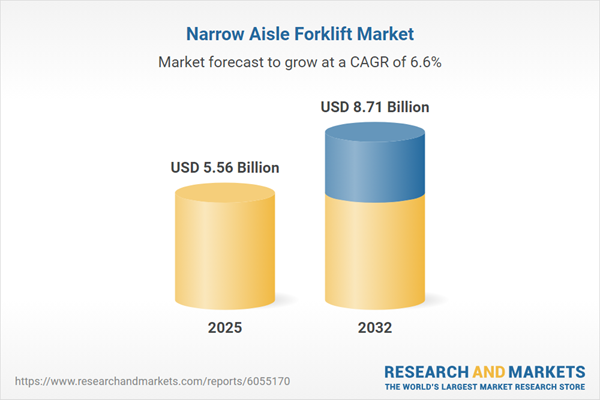Speak directly to the analyst to clarify any post sales queries you may have.
The narrow aisle forklift market is transforming warehouse operations by enabling higher density storage, precision maneuvering, and integration with digital warehouse systems. Senior supply chain executives are leveraging these solutions to drive operational resilience and efficiency within evolving logistics networks.
Market Snapshot: Growth and Strategic Opportunity
The Narrow Aisle Forklift Market grew from USD 5.23 billion in 2024 to USD 5.56 billion in 2025. It is projected to advance at a CAGR of 6.57%, reaching USD 8.71 billion by 2032.
Driven by pressure on warehouse space and order accuracy, narrow aisle forklifts combine vertical reach and compact design. These machines address the increasing demands of omni-channel fulfillment while adapting to both space limitations and shifting workflow priorities. Their role is expanding across varied industries and geographies as businesses seek data-driven, cost-efficient flexible handling solutions aligned with corporate sustainability imperatives.
Scope & Segmentation: Addressing Diverse Operational Needs
- Load Capacity: Up to 1 ton for light-duty and compact applications; 1 to 3 tons targeting mainstream manufacturing and warehousing; Above 3 tons meeting heavy industry and bulky load requirements.
- Type: Order pickers for item-level fulfillment; Reach trucks balancing stability with access in mid-size warehouses; Turret trucks supporting extreme height and tight racking environments.
- Application: Automotive for component handling and assembly; Construction for flexible, dust-resistant machinery; Food & Beverage and Pharmaceuticals requiring hygienic, cold-chain-focused solutions; Retail and Warehousing & Logistics optimizing throughput and labor utilization; Manufacturing improving assembly flow.
- Regional Coverage: Americas (including the United States, Canada, Brazil, Argentina, Chile, Colombia, Peru, Mexico); Europe, Middle East & Africa (United Kingdom, Germany, France, Russia, Italy, Spain, Netherlands, Sweden, Poland, Switzerland, UAE, Saudi Arabia, Qatar, Turkey, Israel, South Africa, Nigeria, Egypt, Kenya); Asia-Pacific (China, India, Japan, Australia, South Korea, Indonesia, Thailand, Malaysia, Singapore, Taiwan).
- Technologies: Electric powertrains, lithium-ion batteries, fleet telematics, predictive maintenance, wireless charging infrastructure, AI-assisted fleet management, automation integration, digital twins, and collision avoidance systems.
- Leading Companies: Crown Equipment Corporation, Toyota Industries Corporation, Jungheinrich AG, KION Group AG, BYD Motors Inc., Mitsubishi Logisnext Europe B.V., Hyster-Yale Materials Handling, Inc., Anhui Heli Co., Ltd., and others advancing ergonomic design and service networks.
Narrow Aisle Forklift Market: Key Takeaways
- Technology upgrade cycles are intensifying as automation, robotics, and digital orchestration enhance warehouse connectivity and drive down error rates.
- Adoption of electric forklifts and battery advancements aligns material handling assets with stricter sustainability and emissions mandates, particularly in regions with robust environmental policies.
- OEMs are strategically realigning sourcing and manufacturing footprints in response to shifting cost structures and evolving regional regulations.
- Integration of fleet management systems and AI ensures better routing, reduced maintenance downtime, and insights for ongoing operational improvements.
- Sectors such as automotive, food & beverage, and pharmaceuticals demonstrate unique requirements, driving specialization in equipment deployed by application.
- Strategic partnerships among OEMs, software developers, and logistics providers are accelerating the delivery of turnkey, value-driven material handling solutions.
Tariff Impact: Navigating Cost Pressures in North America
Recent United States tariffs on core forklift components like steel and electronics have created fresh cost challenges for manufacturers and operators. Many organizations are mitigating these impacts through nearshoring, strengthening regional supplier bases, and extending equipment lifecycles through proactive maintenance and refurbishment rather than large-scale replacements. Transparent collaboration across value chain partners is proving essential for managing price volatility and enabling sustained innovation in this environment.
Methodology & Data Sources
This report applies a rigorous mixed-methods approach featuring executive interviews, secondary research on regulatory filings and industry publications, and triangulation of financial and procurement data. Expert panels validated strategic conclusions and ensured applicability to current industry decision-making needs.
Why This Report Matters: Empowering Senior Decision-Makers
- Supports targeted equipment selection by mapping technology and type to operational priorities.
- Arms leaders with strategic insights into supplier positioning, tariff risks, and technology adoption trends.
- Enables maximized ROI by outlining actionable steps for automation, resource allocation, and risk management.
Conclusion
Narrow aisle forklifts continue to reshape global logistics operations through integration, innovation, and adaptability. This report equips executive stakeholders with the intelligence to make informed investment, procurement, and operational decisions amid complex industry dynamics.
Table of Contents
3. Executive Summary
4. Market Overview
7. Cumulative Impact of Artificial Intelligence 2025
Companies Mentioned
The companies profiled in this Narrow Aisle Forklift market report include:- Anhui Heli Co., Ltd.
- Bobcat Company by Doosan Corporation
- BYD Motors Inc.
- Clark Material Handling Company
- Combilift
- Crown Equipment Corporation
- EP Equipment
- Godrej & Boyce Manufacturing Co. Ltd.
- Hangcha Forklift
- HD Hyundai Construction Equipment Co. Ltd.
- HUBTEX Maschinenbau & Co. KG
- Hyster-Yale Materials Handling, Inc.
- Jungheinrich AG
- KION Group AG
- Komatsu America Corp.
- Liugong Machinery Co., Ltd.
- Lonking (Fujian) International Trade Co., Ltd.
- Manitou BF, SA
- Mitsubishi Logisnext Europe B.V.
- Noblelift Intelligent Equipment Co., Ltd.
- SANY Group
- STILL GmbH
- SUMITOMO Heavy Industries, Ltd.
- Tailift Material Handling Taiwan Co., Ltd.
- Toyota Industries Corporation
Table Information
| Report Attribute | Details |
|---|---|
| No. of Pages | 199 |
| Published | November 2025 |
| Forecast Period | 2025 - 2032 |
| Estimated Market Value ( USD | $ 5.56 Billion |
| Forecasted Market Value ( USD | $ 8.71 Billion |
| Compound Annual Growth Rate | 6.5% |
| Regions Covered | Global |
| No. of Companies Mentioned | 26 |









